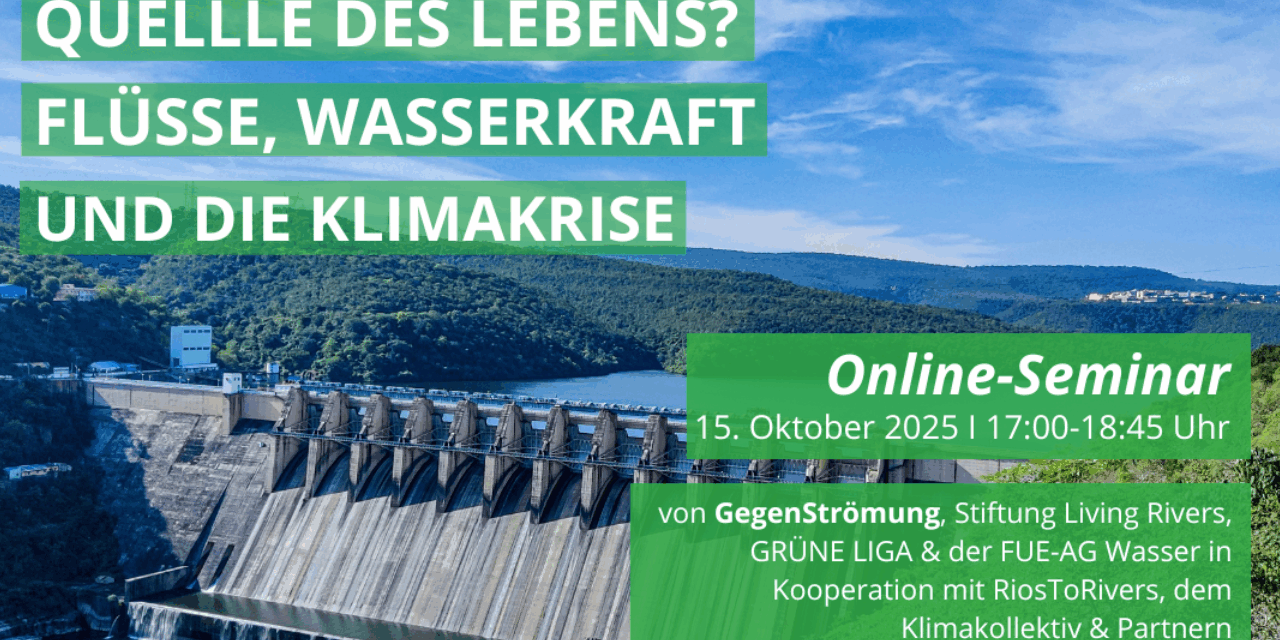On Wednesday, 15 October 2025, GegenStrömung, Stiftung Living Rivers and FUE-AG Wasser, in cooperation with RiosToRivers, the Klimakollektiv and other partners, hosted the online seminar ‘Source of Life? Rivers, Hydropower and the Climate Crisis’.
The event was introduced and moderated by Heike Drillisch (GegenStrömung) and Michael Bender (Living Rivers Foundation / GRÜNE LIGA), and translated into German, English and Spanish.
The first presentation was given by Hayley Stuart, global coordinator of Ríos to Rivers, a non-profit organisation that promotes the next generation of environmentalists by supporting indigenous and disadvantaged young people (more here). She told us about the successful dismantling of four dams on the Klamath River. Through the Paddle Tribal Waters programme, Ríos to Rivers organised the first dam-free river descent by indigenous youth, who had previously been trained in whitewater kayaking and leadership skills to become global advocates for the next steps in the river basin. Brook Thompson, also from Ríos to Rivers, was the second speaker and shared information about the Klamath River restoration process as well as her perspective as an indigenous representative (Yurok & Karuk Native) and environmental engineer. She recounted the fish kill in 2002, when over 60,000 salmon died in the Klamath River, which was a wake-up call for many indigenous communities around the river and ultimately led to the demolition of the dams. With the Klamath River Accord, the dam-critical movement is addressing COP 30 in Belem, Brazil, directly.
The next contribution was given by Moisés Borges from MAB on the Brazilian anti-dam movement. The movement has been in existence since the 1980s. He also presented alternative projects. Moisés Borges spoke about a global campaign to regain the sovereignty of the population, reduce the power of corporations and end impunity, as well as intentional efforts for COP30 in Belem, such as the People’s Summit Towards COP30.
The last presenter was Alex Wernke, from Klima*Kollektiv, who established the connection to the climate movement in Germany. After starting out as a group against lignite, the organisation has reoriented itself and now focuses on water, water pollution and water use. Conflicts on this issue, particularly with various industries, are becoming increasingly prevalent in Germany. Alex Wernke talked about the collective’s days of action on the Weser River, which are dedicated to the destructive feed industry, and presented the river camps planned for 2026.
For the last half hour of the seminar, three working groups were formed for each contribution and exchanged ideas and networked on the respective topics in different breakout rooms.
Overall, it was a successful event, in which efforts to protect our waters and our ecosystem were presented from different perspectives, where people could exchange plans for COP30 in Belém and general information.






![Belo Monte. Foto: christian russau [2016]](https://www.gegenstroemung.org/wp-content/uploads/2018/02/DSCN7237-110x80.jpg)
